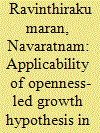|
|
|
Sort Order |
|
|
|
Items / Page
|
|
|
|
|
|
|
| Srl | Item |
| 1 |
ID:
136064


|
|
|
|
|
| Summary/Abstract |
An openness-led growth hypothesis investigates the causal relationship between trade openness1 and economic growth. Indeed, trade openness can stimulate economic growth by enhancing the international flow of knowledge and innovation and by allowing economies of specialization, not only in the production of goods, but also in the generation of new knowledge and new inputs into production. The purpose of this article is to empirically examine an openness-led growth hypothesis, using the case of Sri Lanka for the period from 1965 to 2012. The article uses the recently developed autoregressive distributed lag (ARDL) bounds test for cointegration developed by Pesaran et al. (2001). The empirical results confirm the validity of the openness-led growth hypothesis for Sri Lanka.
|
|
|
|
|
|
|
|
|
|
|
|
|
|
|
|
| 2 |
ID:
143531


|
|
|
|
|
| Summary/Abstract |
The export-led growth (ELG) hypothesis suggests that there is a strong positive linear relationship between a country’s exports and economic growth. For many years, theoretical and empirical studies have examined the causal relationship between exports and economic growth and found that this relationship is one of interdependence rather than of unilateral causation. The purpose of this article is to empirically re-examine the ELG hypothesis in the context of two small South Asian countries: Bangladesh for the period of 1980–2011 and Sri Lanka for the period of 1984–2011. Using a model that controls for a host of domestic and international factors, this article tests the ELG hypothesis by employing the Auto Regressive Distributed Lag (ARDL) bounds test for cointegration and the Granger causality tests. The empirical results confirm the validity of the ELG hypothesis for both Bangladesh and Sri Lanka.
|
|
|
|
|
|
|
|
|
|
|
|
|
|
|
|
| 3 |
ID:
150473


|
|
|
|
|
| Summary/Abstract |
The gradual trend towards the electrification of economies has raised new challenges. Focusing on France, this paper uses monthly data from January 2010 to November 2014, to study the challenge of the simultaneous integration of various sources of generation, and their relationship with economic growth. For the analysis of the dynamics of interaction between electricity sources, the auto-regressive distributed lag (ARDL) bounds test approach was shown to be appropriate, as it allows short- and long-run effects to be distinguished. The results showed that nuclear energy has been a huge driver of economic growth in France and, at the same time, leads to an environment with lower CO2 emissions. Renewables were shown to exert a negative effect on economic growth, which could be due to lack of investment in other sources of production, due to the resilient position held by nuclear sources. The substitution effect among sources is noticeable. The robustness of the results was checked using annual data, from 1970 until 2012, and the results were comparable to those from the monthly data.
|
|
|
|
|
|
|
|
|
|
|
|
|
|
|
|
| 4 |
ID:
193049


|
|
|
|
|
| Summary/Abstract |
Using the data from 1991 to 2019, this study attempts to verify Okun’s law by utilizing both ‘The difference and the dynamic versions’ of Okun’s law in Bangladesh and tries to find the value of Okun’s coefficient. The autoregressive-distribution lag (ARDL) bounds test is applied to determine the existence of a long-term relationship between the variables, and then the ordinary least squares (OLS) approach is used to estimate the findings. The findings show that Okun’s coefficient is –0.058 for the difference version of Okun’s law, which is statistically insignificant. In addition, for the dynamic version of Okun’s law, findings show that the effect of the ‘immediate past economic growth rate’ on ‘current change in the unemployment rate’ is 0.15, and it is statistically insignificant too. However, the effect of the ‘current economic growth rate’ on ‘current change in the unemployment rate’ is –0.22, and it is statistically significant at 10% significance level. In both versions of Okun’s law, R2 values, F-statistic and cumulative sum of squares show the instability of the models. Due to statistically insignificant coefficients and model instability, it can be concluded that Okun’s law is invalid in Bangladesh.
|
|
|
|
|
|
|
|
|
|
|
|
|
|
|
|
| 5 |
ID:
125826


|
|
|
|
|
| Publication |
2013.
|
| Summary/Abstract |
The Algerian economy is an example of a high level of rentierism, while the Egyptian economy shows a low/moderate level of rentierism. The ARDL bounds test approach was used upon annual time series data from 1965 to 2010. The results suggest cointegration for both countries. Bi-causality between energy consumption and growth in the long run was found. For Algeria there is a reversed (negative) energy-growth nexus, adding a new relationship to the traditional four causal hypotheses on the energy-growth nexus. For Egypt, we found positive elasticity both of oil price and energy, which is in line with the mainstream.
|
|
|
|
|
|
|
|
|
|
|
|
|
|
|
|
|
|
|
|
|